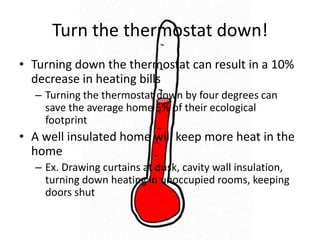Hre4m1 unit 14 15 ppt
- 2. Travel Smarter • The average vehicle drives around 12,000 miles and uses 545 gallons of gas at 22mpg creating 10,000 lbs/CO2 per year. • Reduce car trips, carpool and take public transit when possible to save both gas and emissions. • Make the next vehicle you buy more efficient
- 3. Eat Smarter! • Eat less meat – Going vegan saves about 4000 lbs/CO2 per year – Reducing meat consumption by half saves around 1600 lbs/CO2 per year • Buy locally grown foods – Purchasing food from local growers and producers help reduce the distance the food has travelled (this reduces CO2 emissions and food is more fresh!) – Buy bulk foods to reduce packaging
- 4. Don’t let excess water go down the drain! • Cutting back shower time by three minutes can reduce CO2 by up to 715lbs per year – Cutting back five minutes saves 9125 gallons of water and up to $122 in heating costs • Letting the faucet run on its own while shaving, brushing teeth, or washing dishes wastes water – Resources go down the drain and not to mention your money will too!
- 5. Lighting • Standard incandescent bulbs vs. compact fluorescent bulbs (CFLs) – ENERGY STAR qualified bulbs use about 75 % less energy than standard incandescent bulbs and last up to 10 times longer, saving you $100 or more per bulb. • Turn off the lights – 60-watt bulb left on for one hour a day will waste about $4 worth of electricity and emit an extra 21lbs of carbon dioxide
- 6. Wash your clothes irregularly! • 60% of the energy associated with a piece of clothing is spent washing and drying it – Over its lifetime, a Tshirt can be responsible for 9lbs of CO2 emissions – Check to see if clothes need to be washed between wearing
- 7. Reduce buying new things! • Around 10% of our ecological footprint is made up of the things we buy – Instead of buying new things, try buying second- hand or borrowing
- 8. Reduce, Reuse, Recycle! • American citizens produce an average 4.5lbs of waste daily – Recycle paper, plastics, glass, and metals to reduce waste • Recycle shopping bags or use reusable tote bags to the store – Making bags from recycled polyethylene takes one third the sulfur dioxide and half the nitrous oxide, than making them from new material.
- 9. Turn the thermostat down! • Turning down the thermostat can result in a 10% decrease in heating bills – Turning the thermostat down by four degrees can save the average home 5% of their ecological footprint • A well insulated home will keep more heat in the home – Ex. Drawing curtains at dusk, cavity wall insulation, turning down heating in unoccupied rooms, keeping doors shut
- 10. Choose green! • Choose green designs for your building (ex. Passive solar heating, rainwater catchment, grey water recycling system, recycled materials) • Choose efficient appliances (ex. Low flow shower heads, faucets, toilets) • Choose second-hand, recycled, or sustainably produced furnishings • Use biodegradable and non-toxic products
- 11. Unplug! • Electronics continue to use electricity when they are plugged in even if they are turned off! – Unplug to reduce energy use and carbon emissons – Unplugging will save “parasitic power loss” the power of these items even when they are turned off
- 12. Works Cited • "Ecological Footprint Facts." CTEnergyEducation. N.p., n.d. Web. 22 May 2012. <https://docs.google.com/viewer?a=v&q=cache:_SVmRroXBOsJ:www.cten ergyeducation.com/images/Ecological%2520Footprint%2520Facts.doc+&h l=en&gl=ca&pid=bl&srcid=ADGEEShBK_XxwBfkFhVzcJVFBWZUkKwtGq4C_ qVhVI-Xcm1DoxbUAZm-MBwF- ZK15I6MI2tHqPHxOZTNj5NJE9QXBOFpkoaVWgJ_K>. • "Reduce your footprint: Ecological Footprint Quiz by Center for Sustainable Economy." Ecological Footprint Quiz by Center for Sustainable Economy. N.p., n.d. Web. 22 May 2012. <http://www.myfootprint.org/en/take_action/reduce_your_footprint/>. • "Top ten ways to reduce your ecological footprint - WWF UK ." WWF UK - Conservation, climate change, sustainability . N.p., n.d. Web. 22 May 2012. <http://www.wwf.org.uk/what_we_do/changing_the_way_we_live/cities/ top_ten_ways_to_reduce_your_ecological_footprint.cfm>.











